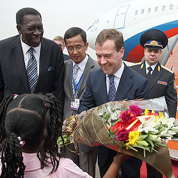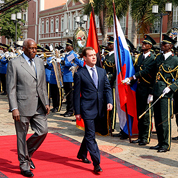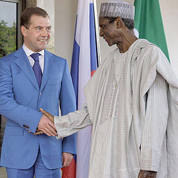Kremlin boosting Russia’s position and influence in Africa

An unmistakable sign that the Kremlin is really intent on boosting its traditional good ties with African countries is evident in the composition of the official delegation, which included top government, military personnel and key representatives of Russian businesses drawn from all spheres of the economy. The June visit is a continuation of the Kremlin’s new strategic policy vision for Africa that saw former President Vladimir Putin touring mostly southern and northern African countries during his eight years in office, whilst other top-level government officials have been tasked with maintaining regular contacts with their counterparts on the continent.

Whilst past Russian leaders have been to Egypt, Medvedev was the first Russian president to officially visit Nigeria — the most populous country on the continent with abundant mineral and other natural resources — as well as Angola and Namibia, which are also similarly endowed by nature with rich natural resources, which have attracted top international investors to the areas. Indeed, Russia’s imprint goes deeper in the African history, starting with helping to decolonize the continent in the 1960s to the establishment of friendly bilateral ties with independent African countries and providing them with free military aid, education and other necessities.
It needs to be noted here that post-communist Russia, almost 20 years after the collapse of the Soviet Union, has so far been unable to successfully convert the huge affinity of African leaders for and their good-hearted predisposition to Moscow established by the Soviet leadership. For instance, Egypt President Hosni Mubarak, one of Medvedev’s hosts on the Africa tour, was Soviet-educated.
The recent overture of the Kremlin is an attempt to leverage these ties for the benefit of all parties involved. Thus, the bilateral talks in Egypt, Nigeria, Namibia and Angola, were mainly focused on boosting ties in trade and other key economic issues, especially in tourism, precious metals, nuclear and energy sectors, where several Russian companies, led by the industry leaders — Gazprom, Alrosa, Rosatom, Rosnano, AvtoVAZ, etc., are planning serious joint projects with their counterparts on the continent. For instance, Gazprom is reportedly interested in building a joint LNG project in Nigeria that will require a $2.5bln investment outlay, while Alrosa, Rosatom and other Russian corporations also nurse similar investment plans all over the continent.

In all, top Russian corporations have earmarked about $10bln for investments on the Black Continent, with over half of this sum already disbursed for specific projects in the region. Though these figures are still light years away from the Soviet-era’s data, the current trends, including the Kremlin’s new foreign policy strategy for the continent, evident in Medvedev’s statement that Russia now intends to compete on equal footing with other superpowers on the continent, are highly positive and promising. It, therefore, means that Medvedev’s nearly a week-long presence on the continent meeting with heads of states, other top politicians and local business elites across Africa will surely boost Russia’s zone of economic interests and political influence on the Black Continent that will surely help solve some of the thorniest problems and issues in the region.












 Web design,
Web design,